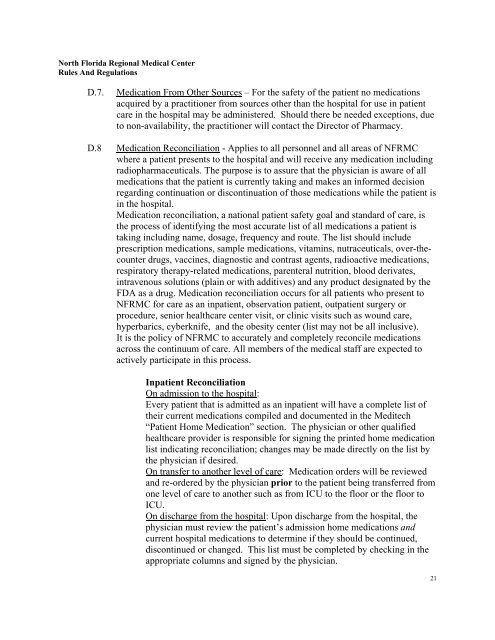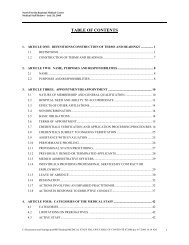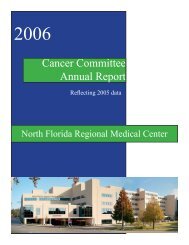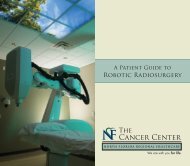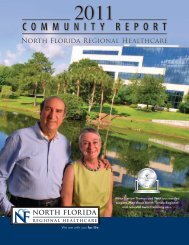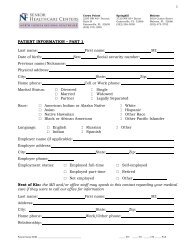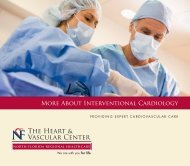Rules and Regulations 2013 - North Florida Regional Medical Center
Rules and Regulations 2013 - North Florida Regional Medical Center
Rules and Regulations 2013 - North Florida Regional Medical Center
Create successful ePaper yourself
Turn your PDF publications into a flip-book with our unique Google optimized e-Paper software.
<strong>North</strong> <strong>Florida</strong> <strong>Regional</strong> <strong>Medical</strong> <strong>Center</strong><br />
<strong>Rules</strong> And <strong>Regulations</strong><br />
D.7.<br />
Medication From Other Sources – For the safety of the patient no medications<br />
acquired by a practitioner from sources other than the hospital for use in patient<br />
care in the hospital may be administered. Should there be needed exceptions, due<br />
to non-availability, the practitioner will contact the Director of Pharmacy.<br />
D.8 Medication Reconciliation - Applies to all personnel <strong>and</strong> all areas of NFRMC<br />
where a patient presents to the hospital <strong>and</strong> will receive any medication including<br />
radiopharmaceuticals. The purpose is to assure that the physician is aware of all<br />
medications that the patient is currently taking <strong>and</strong> makes an informed decision<br />
regarding continuation or discontinuation of those medications while the patient is<br />
in the hospital.<br />
Medication reconciliation, a national patient safety goal <strong>and</strong> st<strong>and</strong>ard of care, is<br />
the process of identifying the most accurate list of all medications a patient is<br />
taking including name, dosage, frequency <strong>and</strong> route. The list should include<br />
prescription medications, sample medications, vitamins, nutraceuticals, over-thecounter<br />
drugs, vaccines, diagnostic <strong>and</strong> contrast agents, radioactive medications,<br />
respiratory therapy-related medications, parenteral nutrition, blood derivates,<br />
intravenous solutions (plain or with additives) <strong>and</strong> any product designated by the<br />
FDA as a drug. Medication reconciliation occurs for all patients who present to<br />
NFRMC for care as an inpatient, observation patient, outpatient surgery or<br />
procedure, senior healthcare center visit, or clinic visits such as wound care,<br />
hyperbarics, cyberknife, <strong>and</strong> the obesity center (list may not be all inclusive).<br />
It is the policy of NFRMC to accurately <strong>and</strong> completely reconcile medications<br />
across the continuum of care. All members of the medical staff are expected to<br />
actively participate in this process.<br />
Inpatient Reconciliation<br />
On admission to the hospital:<br />
Every patient that is admitted as an inpatient will have a complete list of<br />
their current medications compiled <strong>and</strong> documented in the Meditech<br />
“Patient Home Medication” section. The physician or other qualified<br />
healthcare provider is responsible for signing the printed home medication<br />
list indicating reconciliation; changes may be made directly on the list by<br />
the physician if desired.<br />
On transfer to another level of care: Medication orders will be reviewed<br />
<strong>and</strong> re-ordered by the physician prior to the patient being transferred from<br />
one level of care to another such as from ICU to the floor or the floor to<br />
ICU.<br />
On discharge from the hospital: Upon discharge from the hospital, the<br />
physician must review the patient’s admission home medications <strong>and</strong><br />
current hospital medications to determine if they should be continued,<br />
discontinued or changed. This list must be completed by checking in the<br />
appropriate columns <strong>and</strong> signed by the physician.<br />
21


